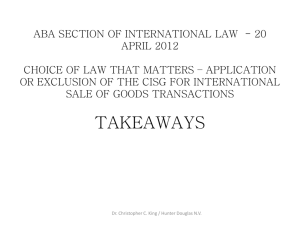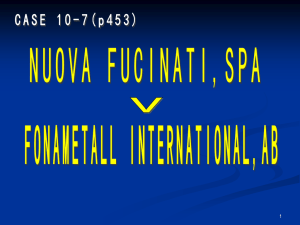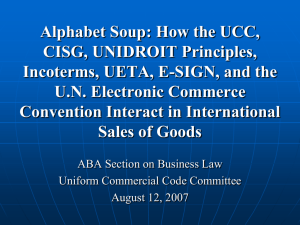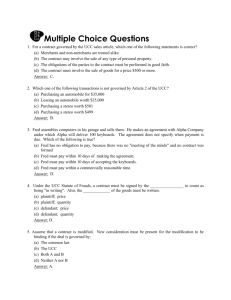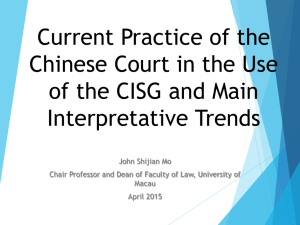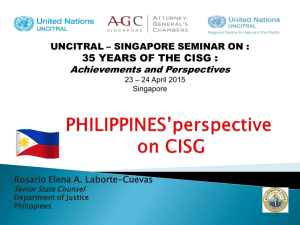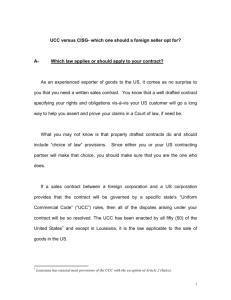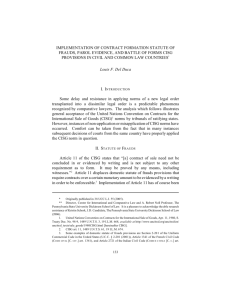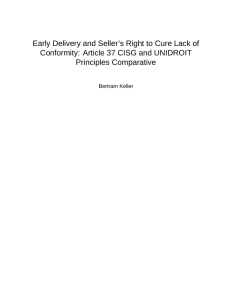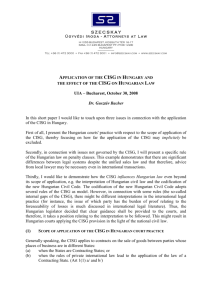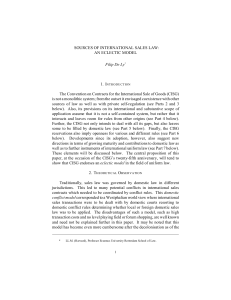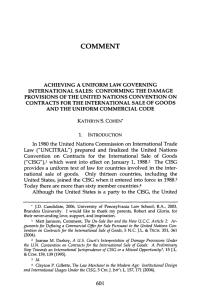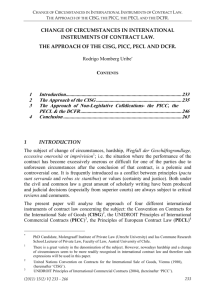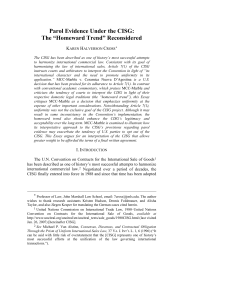1 Contracts Professor Keith A. Rowley William S. Boyd School of
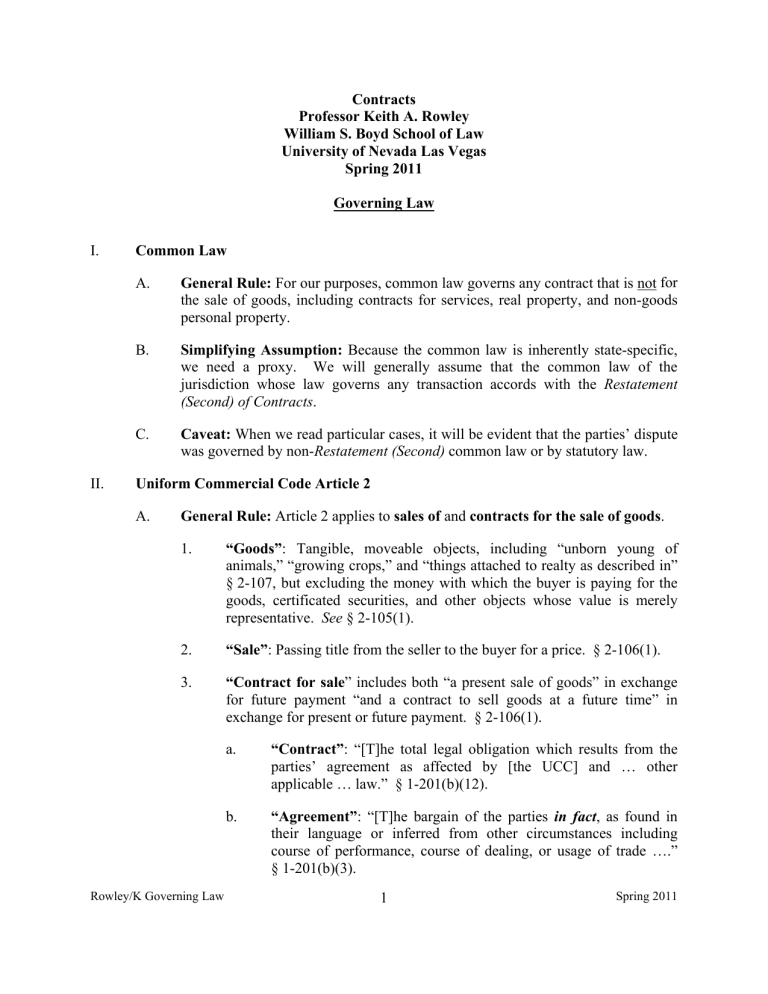
Contracts
Professor Keith A. Rowley
William S. Boyd School of Law
University of Nevada Las Vegas
Spring 2011
Governing Law
I.
Common Law
A.
General Rule:
For our purposes, common law governs any contract that is not for the sale of goods, including contracts for services, real property, and non-goods personal property.
B.
Simplifying Assumption:
Because the common law is inherently state-specific, we need a proxy. We will generally assume that the common law of the jurisdiction whose law governs any transaction accords with the Restatement
(Second) of Contracts
.
C.
Caveat:
When we read particular cases, it will be evident that the parties’ dispute was governed by nonRestatement (Second) common law or by statutory law.
II.
Uniform Commercial Code Article 2
A.
General Rule:
Article 2 applies to sales of
and contracts for the sale of goods
.
1.
2.
“Goods”
: Tangible, moveable objects, including “unborn young of animals,” “growing crops,” and “things attached to realty as described in”
§ 2-107, but excluding the money with which the buyer is paying for the goods, certificated securities, and other objects whose value is merely representative. See § 2-105(1).
“Sale”
: Passing title from the seller to the buyer for a price. § 2-106(1).
3.
“Contract for sale
” includes both “a present sale of goods” in exchange for future payment “and a contract to sell goods at a future time” in exchange for present or future payment. § 2-106(1). a.
“Contract”
: “[T]he total legal obligation which results from the parties’ agreement as affected by [the UCC] and … other applicable … law.” § 1-201(b)(12).
Rowley/K Governing Law b.
“Agreement”
: “[T]he bargain of the parties in fact
, as found in their language or inferred from other circumstances including course of performance, course of dealing, or usage of trade ….”
§ 1-201(b)(3).
1 Spring 2011
B. “Mixed” Contracts: Goods vs. non-Goods
1.
Majority Approach – “Predominant Purpose” Test buyer’s predominant purpose for entering into the underlying transaction; that is, what was the buyer most interested in buying?
: What was the a. If , then Article 2 applies to the entire transaction
.
♦
Example: Advent Systems Ltd. v. Unisys Corp.,
925 F.2d
670 (3d Cir. 1991) (holding that Article 2 applied to a contract for the provision of computer hardware and training services because “the contract’s main objective was to transfer ‘products’ and training was “but a small part of the parties’ contemplated relationship”).
2. b. If , then Article 2 does not apply to any part of the transaction
.
♦ Example: Care Display, Inc. v. Didde-Glaser, Inc. , 589
P.2d 599 (Kan. 1979) (holding that a contract for the design, delivery, and installation of a custom trade show display was primarily for the promisee’s design services, rather than the finished product resulting from those services).
Minority Approach – “Gravamen of the Action” Test : What part of the underlying transaction gives rise to the Plaintiff’s complaint? a. If , then Article 2 applies to the complaint
, even if the predominant purpose of the transaction was to buy non-goods.
♦ Example: Anthony Pools v. Sheehan , 455 A.2d 434 (Md.
1983) (holding that Article 2 governed the plaintiff’s complaint that the diving board the defendant supplied was defective, despite the fact that the predominant purpose of the plaintiff’s contract was for the defendant to design and install a swimming pool and accessories). b. If , then Article 2 does not apply to the complaint , even if the predominant purpose of the transaction was to buy goods.
♦
Example: H. Hirschfield Sons v. Colt Industries
Operating Corp.
, 309 N.W.2d 714 (Mich. Ct. App. 1981)
(holding that the UCC did not apply to the plaintiff’s complaint alleging that the defendant defectively installed the railroad and truck scale defendant sold to the plaintiff).
Rowley/K Governing Law 2 Spring 2011
III. The U.N. Convention on Contracts for the International Sale of Goods
A.
General Rule:
Contracts for the sale of goods between a resident of the U.S. and a resident of another country are governed by the 1980 United Nations
Convention on Contracts for the International Sale of Goods (“CISG”).
♦ As of January 1, 2011, the United States and 75 other countries had acceded, accepted, approved, ratified, or succeeded to the CISG and the convention was in force in 74 countries (including the U.S.).
B.
Exceptions:
The CISG does not apply to a contract for the sale of goods if
1. the foreign buyer or seller’s place of business or “habitual residence” is in a country that has not ratified the CISG, Arts. 1(1)(a) &10(b);
2. even though the foreign buyer or seller’s place of business or habitual residence is in a country that has ratified the CISG, the buyer or seller neither knew nor had reason to know that it was dealing with a party whose place of business or habitual residence was in a foreign country,
Art. 1(2);
3. the goods are being purchased for personal, family, or household use, unless the seller neither knew nor had reason to know at any time prior to or at the conclusion of the contract of the goods’ intended use by the buyer, Art. 2(a);
4. the sale is otherwise excluded by Art. 2(b)-(f);
5. the buyer of specially-manufactured goods undertakes to supply the seller with “a substantial part of the materials necessary” to manufacture the goods, Art. 3(1); or
6. the preponderant part of the seller’s obligations consists of providing labor or other services, Art. 3(2).
C.
Freedom of Contract
1. Parties to a contract that would otherwise be governed by the CISG may contractually agree not to be governed by it in part or in whole, Art. 6, subject to certain limitations set forth in Article 12.
2. By the same token, parties to a contract that would otherwise not be governed by the CISG may contractually agree to be governed by it in part or in whole, except to the extent that the CISG may conflict with some inalienable domestic law provision.
Rowley/K Governing Law 3 Spring 2011
D. Resolving Conflicts Between the CISG and the UCC : The CISG “trumps” the
UCC in cases where the CISG applies.
See
U.S.
C
ONST
. art. VI, cl. 2.
E.
Resolving Conflicts Between Domestic and non-CISG Foreign Law
: While this is a potentially sticky issue, given that a handful of the United States’ major trading partners have not ratified the CISG, in the absence of some specific foreign law, we will err on the side of oversimplifying and apply the UCC or common law, whichever is appropriate.
IV.
The Uniform Electronic Transactions Act
A.
Basic Scope:
UETA applies to “electronic records and electronic signatures relating to a transaction” governed, inter alia
, by common law and UCC Article 2.
UETA § 3(a) & (b)(2).
♦ UETA does not specifically indicate that it applies to contracts governed by the CISG. However, § 3(a) provides that, unless excluded by § 3(b),
UETA applies to all transactions. In any event, because the CISG does not have a statute of frauds, UETA’s application is a matter of academic, rather than practical, interest.
B. “Opting In”: UETA only applies to transactions “between parties each of which has agreed to conduct transactions by electronic means.”
Id.
§ 5(b).
♦ Whether the parties agree to transact electronically “is determined from the context and surrounding circumstances, including the parties’ conduct.” Id.
♦ Thus, for example, if S faxed her offer to B, and B e-mailed his acceptance to S, the parties will be deemed to have agreed to conduct their transaction by electronic means. See id.
§§ 2(5) & 5 cmt. 4.
C.
Procedure vs. Substance:
Unlike common law, UCC Article 2, or the CISG,
UETA is not intended to be a comprehensive body of law that governs electronic transactions. Rather, it is intended to cut across a number of substantive bodies of law, and supplement them in such a way as to facilitate electronic transacting.
See id.
§ 3(d).
D. Contracts governed by the law of a state that has not enacted UETA (Illinois, New
York, and Washington) – and, perhaps, contracts otherwise governed by the law of a UETA-enacting state but in which both parties have not consented to transact electronically – are subject to the federal
Electronic Signatures in Global and
National Commerce Act (“E-SIGN”) , 15 U.S.C. § 7001 et seq.
, which has much the same effect as UETA. But, unlike most instances where federal and state legislation overlap, E-SIGN expressly yields to UETA.
See id.
§ 7002(a)(1).
Rowley/K Governing Law 4 Spring 2011
